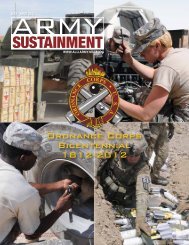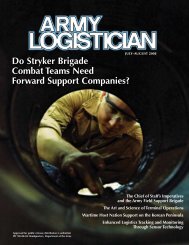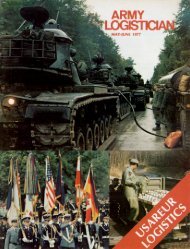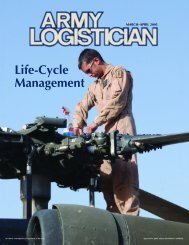Medical Logistics - Army Logistics University - U.S. Army
Medical Logistics - Army Logistics University - U.S. Army
Medical Logistics - Army Logistics University - U.S. Army
You also want an ePaper? Increase the reach of your titles
YUMPU automatically turns print PDFs into web optimized ePapers that Google loves.
positional or organizational levels. Given the complex<br />
nature of the right-quadrant types of knowledge, we<br />
cannot predetermine what is strategic, operational, or<br />
tactical in that regard. So, our education and development<br />
concepts are better tuned to applying the scope<br />
and methods of the four types of knowledge than trying<br />
to apply the levels of war as levels of organization or<br />
positional development.<br />
The unstructured aspects of dynamic logistics and<br />
logistics sensemaking are very challenging because<br />
military institutions cannot pre-engineer their training<br />
and education programs around them (as they can do<br />
with logistics humanities and art and logistics science<br />
types). Nevertheless, the challenge has to be met, perhaps<br />
through “structuring the unstructured” by placing<br />
units, trainees, and students in as near free-play,<br />
highly complex situations as we can simulate or create<br />
through sophisticated “real-world” action research<br />
opportunities. The traditional “best practice” approach<br />
is replaced with a “reflective practice” approach.<br />
As discussed extensively in the published works of<br />
Major Don Vandergriff, USA (Ret.), with his groundbreaking<br />
work on the <strong>Army</strong> Basic Officer Leadership<br />
Course II, the <strong>Army</strong> is capable of training and educating<br />
Soldiers to deal with dynamic and sensemaking<br />
opportunities and to be judged on their decisions in<br />
near-real time.<br />
The movement toward network centricity in military<br />
organizational design and concept development<br />
also makes a lot of sense. Systems theory holds that<br />
Statement of Ownership, Management, and Circulation<br />
(required by 39 U.S.C. 3685).<br />
42<br />
networked organizations are more highly adaptive,<br />
enabling the flexibility required in highly fluid situations.<br />
The reason is that all members of the network<br />
organization can be engaged in making sense of chaotic<br />
situations. This sensemaking through high quality<br />
human network connections can facilitate improvisation<br />
among the members of the logistics community<br />
(perhaps this is the principal task of the postmodern<br />
logistician). Finally, military logistics professionals<br />
have an obligation to pursue self-development in view<br />
of all of these types of knowledge.<br />
In this article, I have attempted to offer a more holistic<br />
way of framing the nature of professional military<br />
logistics knowledge. It is my hope that the community<br />
of military logistics educators and practitioners can<br />
apply this framework when collaborating. I believe the<br />
framework, while limited in its specificity about what<br />
to do, is unlimited in its capacity to frame how to think<br />
about our abstract body of knowledge. I challenge the<br />
field to incorporate the framework in future discussions<br />
about the education and development of our profession<br />
or at least argue why not. ALOG<br />
dr. Ch r i s t o p h e r r. paparone is an assoCiate<br />
professor in t h e ar M y Co M M a n d a n d General staff<br />
ColleGe’s departMent o f loGistiCs a n d resourCe<br />
operations at fo r t lee, VirGinia. a retired ar M y<br />
C o l o n e l, h e h a s a ph.d. f r o M pe n n s y l V a n i a state<br />
uniVersity.<br />
The name of the publication is <strong>Army</strong> Logistician, an official publication, published bimonthly by<br />
Headquarters, U.S. <strong>Army</strong> Combined Arms Support Command, for Headquarters, Department of<br />
the <strong>Army</strong>, at the U.S. <strong>Army</strong> <strong>Logistics</strong> Management College (ALMC), Fort Lee, Virginia. Editor is<br />
Robert D. Paulus, ALMC, Fort Lee, VA 23801-1705. Extent and nature of circulation: the figures<br />
that follow are average numbers of copies of each issue for the preceding 12 months for the<br />
categories listed.<br />
Printed: 15,958.<br />
Total paid circulation, sold through Government Printing Office: 367.<br />
Requested distribution by mail, carrier, or other means: 15,466.<br />
Total distribution: 15,833.<br />
Copies not distributed in above manner: 125.<br />
Actual number of copies of a single issue published nearest to the filing date: 15,294.<br />
I certify that the statements made above by me are correct and complete:<br />
______________________________<br />
Robert D. Paulus, 4 September 2008.<br />
NOVEMBER–DECEMBER 2008







